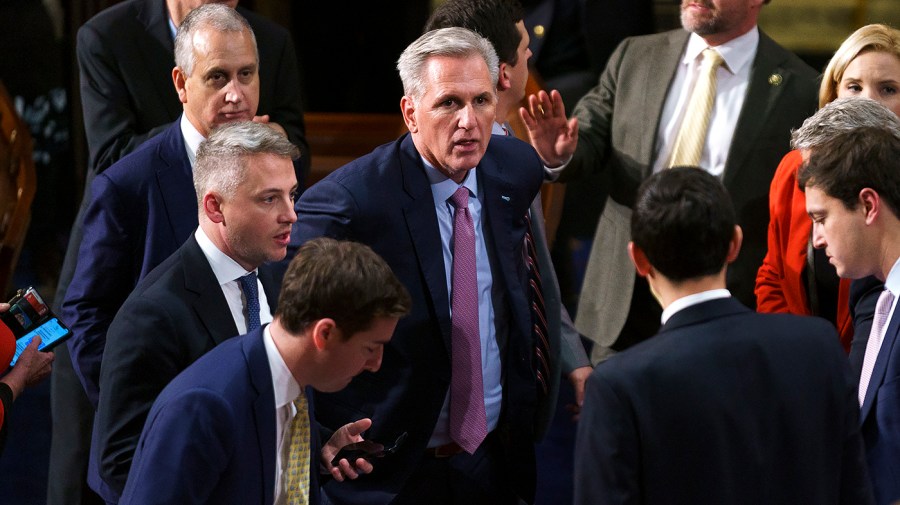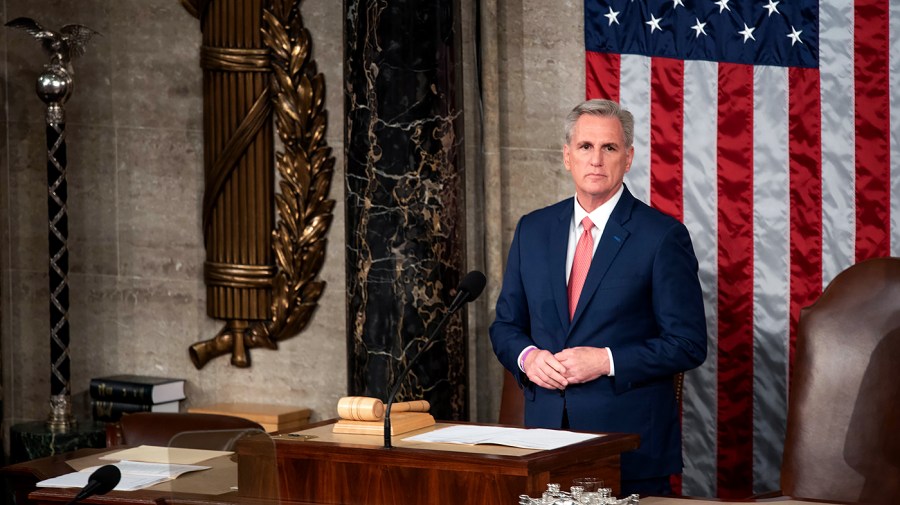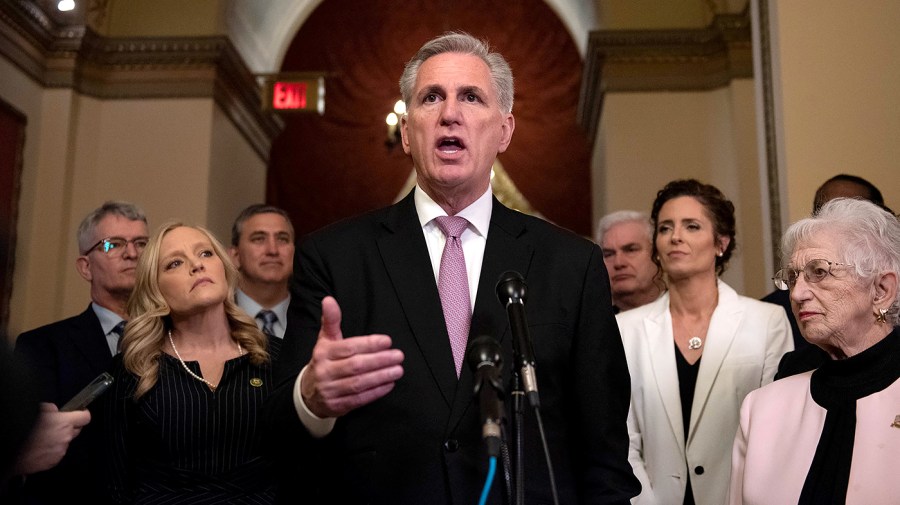100 days in power: House GOP honeymoon may be over

For Speaker Kevin McCarthy, the honeymoon may be over.
The California Republican endured a torturous road to the Speakership in January but recovered quickly with a legislative agenda that’s highlighted GOP priorities, planted a marker on China policy, thrown Democrats on defense and even steamrolled President Biden into signing a contentious measure overturning Washington, D.C.’s, criminal sentencing law.
Yet as McCarthy reaches the 100-day mark of the new Congress, he’s facing down the toughest tests of his roller-coaster tenure, as Republicans brace for soul-defining battles with Biden and Democrats over raising the debt ceiling and funding the government — two crucial debates where failure brings the potential to crash an already fragile economy.
Republicans are generally united behind McCarthy’s attempts to force Biden to negotiate spending cuts as a condition for raising the debt ceiling — a stipulation the president has so far refused.
But their position has been blunted by internal disputes over policy priorities, behind-the-scenes tensions between McCarthy and other top Republicans and the GOP’s simple failure to coalesce around a long-term budget blueprint to counter Biden’s proposal heading into the talks.
Additionally, McCarthy’s Speaker-election concession to allow any one member to launch a vote to recall his gavel hangs over his leadership.

Rep. Kevin McCarthy (R-Calif.) is seen as the House votes to adjourn following the fourteenth ballot for Speaker on Friday, January 6, 2023. (Greg Nash)
The combination confronts McCarthy with the greatest challenge since he took the gavel, testing his ability to unite a restive conference in a debate where the very notion of success is ill-defined and a misfire could prompt economic turmoil, efforts to boot him from the Speakership, or both.
“There are [Republican] members who — whether explicitly or implicitly — make it clear that they are not going to go along with an agenda that they don’t like. So this is a really, really difficult spot,” Rep. Jan Schakowsky (D-Ill.), a senior member of the Budget Committee, said of McCarthy’s position.
“We’ll see if he can make it through.”
The coming fiscal debates over must-pass legislation will differ from those that defined the first three months of the year, when McCarthy’s new GOP majority focused largely on messaging bills designed to enliven the party base and, at times, highlight Democratic divisions on hot-button issues like crime and immigration.
The high-water mark of that strategy was the proposal to repeal the D.C. crime bill, which Biden signed into law after initially signaling his opposition — a reversal that infuriated Democrats who voted ‘no’ and felt left out to dry.
Related content from The Hill
- GOP faces difficult budget fight as it nears 100 days in power
- Five lawmakers shaping the House GOP majority over the first 100 days
McCarthy also found some early victories on foreign policy, winning high marks for launching a bipartisan select committee to confront China’s global influence and staging a well-received meeting with Taiwan’s president last week in California that even got praise from former Speaker Nancy Pelosi (D-Calif.).
Yet GOP leaders have also struggled out of the gate with several of their highest-priority agenda items, including a border bill leaders hoped to bring to the floor in the opening weeks of the session but is now expected to start moving as part of a larger package this month.

Speaker Kevin McCarthy (R-Calif.) is seen before President Biden delivers his State of the Union address to a joint session of Congress at the Capitol in Washington, D.C., on Tuesday, February 7, 2023. (Annabelle Gordon)
“New majorities — there’s always a bit of a learning curve,” Rep. Tom Cole (R-Okla.), chairman of the powerful Rules Committee, acknowledged.
“Anytime you have a five-seat majority, it’s going to be difficult to govern,” Rep. Tony Gonzales (R-Texas) said.
Those struggles have underscored the difficulties now facing McCarthy as he seeks budget agreements that can win over not only the diverse voices in his GOP conference, but Biden and the Democrats, as well.
House Majority Whip Tom Emmer (R-Minn.) insisted that House GOP leadership is unified, but embraced the wrangling that comes with operating a slim majority under new rules that — unlike those under Democratic control — have empowered rank-and-file lawmakers with more opportunities to craft legislation.
“Tension, as a group? That’s a good thing. I hope we’re challenging each other. I hope we’re pushing each other,” Emmer said.
“As a Republican team, does that mean that we all agree on everything? No. Nor should we,” he added. “People should be challenging one another, and people should be pushing one another. Every once in a while, it should actually feel uncomfortable.”
While Republicans are generally happy to open the floor to countless amendments and empower rank-and-file lawmakers to craft legislation, they also acknowledge a major drawback: It makes it tougher for GOP leaders to win bipartisan support, which is required to enact bills into law, and can even harm a bill’s chances within the conference.
A high-priority parental bill of rights, for example, eked its way to passage after five Republicans defected, including the bill’s co-sponsor who said some of the amendments were unacceptable.
“This is an open process; people get more of a say,” said Rep. Don Bacon (R-Neb.). “But I also think the downside is some of these votes become more partisan through the amendments.”
Republicans of all stripes appear to be on board with McCarthy’s effort to bring Biden to the negotiating table on the debt ceiling, even as individual members continue to disagree over how to approach to certain programs, like Social Security and Medicare, and the Budget Committee has delayed the release of its promised 10-year blueprint.

President Biden and Speaker Kevin McCarthy (R-Calif.) leave the Friends of Ireland Luncheon at the U.S. Capitol in Washington, D.C., on Friday, March 17, 2023. (Greg Nash)
To help project a united front, Rep. Garret Graves (R-La.), who played a central part in negotiations to secure the gavel for McCarthy, has taken a key role in getting the various factions of the conference behind McCarthy’s negotiating tactics. And Republicans across the conference insist that the increase in cross-ideological conversations that accompanied the tense Speaker’s race have only helped them tackle other issues since then.
“Admittedly, after that first week, you could have all been forgiven for assuming that we were to aim and can’t shoot straight. But the reality is, we’ve done more talking than … we’ve ever done before,” Rep. Dusty Johnson (R-S.D.), chair of the Main Street Caucus, said.
Those talks are certain to intensify when Congress returns to Washington next week following its long spring recess and faces a shrinking window to raise the cap on the government’s borrowing authority.
Treasury Department officials have said the agency could hit that cap as early as June, requiring congressional action before then to prevent a default. But as Congress left Washington for the two-week break, the sides were nowhere near a deal. And McCarthy has said the next move from Republicans could be to introduce a debt ceiling proposal unilaterally, without negotiating with Biden.
“If the president refuses to negotiate with the Speaker we’ll be forced to pass something out in the House, which, that’s fine,” Emmer said. “If they want us to lead, House Republicans are set to do that.”

Speaker Kevin McCarthy (R-Calif.) speaks during a press conference on the House passing the Parents Bill of Rights on Friday, March 24, 2023. (Annabelle Gordon)
Republicans are seeking to decouple their nascent budget blueprint from the debt ceiling debate — an effort to nullify Biden’s demands to see the GOP’s specific 10-year plan before meeting with McCarthy.
But corralling Republicans behind any fiscal plan with black-and-white specifics could be tricky, particularly as party leaders seek enormous spending cuts while simultaneously taking some of the biggest-ticket items — including Social Security, Medicare, the Pentagon and tax hikes — off the table.
“It’s a self-constructed problem,” Rep. Earl Blumenauer (D-Ore.), another senior member of the Budget Committee, said. “They’re unwilling to identify areas of the budget that they will cut, no areas of revenue that they will raise, and the extreme elements want to do things that even Republicans don’t agree with.”
Outside of the policy obstacles, there are also political headwinds complicating McCarthy’s task ahead. One indication of internal leadership challenges is that Graves, rather than House Budget Chair Jodey Arrington (R-Texas), is taking a leading role in debt ceiling strategy.
Tension between Arrington and McCarthy broke into public view after Arrington told Bloomberg News that the House GOP was finalizing a “deal sheet” on a debt ceiling deal. But when asked about the proposals, McCarthy was terse.
“I don’t know what he’s talking about,” McCarthy said.
Shortly afterwards, The New York Times reported that McCarthy has told colleagues he has little confidence in Arrington, who the Times reported had approached colleagues to see if they would back House Majority Leader Steve Scalise (R-La.) for Speaker as McCarthy faced continuous failed votes.
Still, McCarthy is downplaying any internal strife within the conference.
A statement from the Speaker said he “flatly” rejects that there are any fissures, and that Arrington’s budgetary work “will only make our conference stronger.”
This is part of a series from The Hill on the House GOP’s first 100 days in power. Check out more coverage on TheHill.com.
Copyright 2023 Nexstar Media Inc. All rights reserved. This material may not be published, broadcast, rewritten, or redistributed. Regular the hill posts







